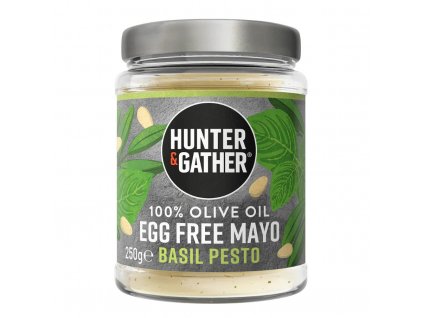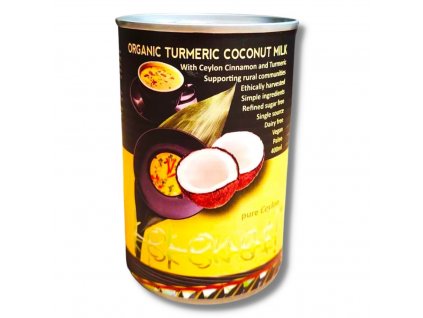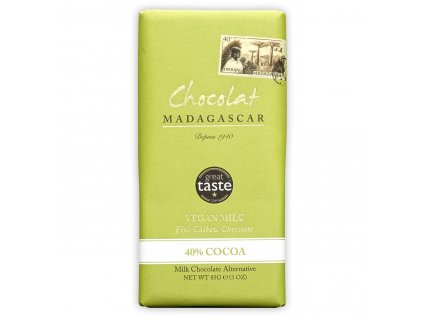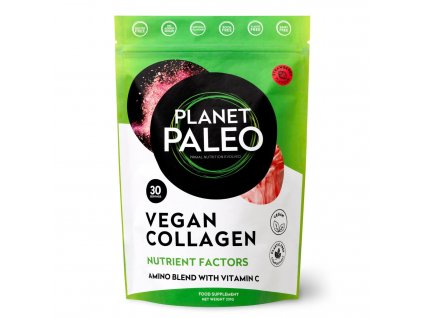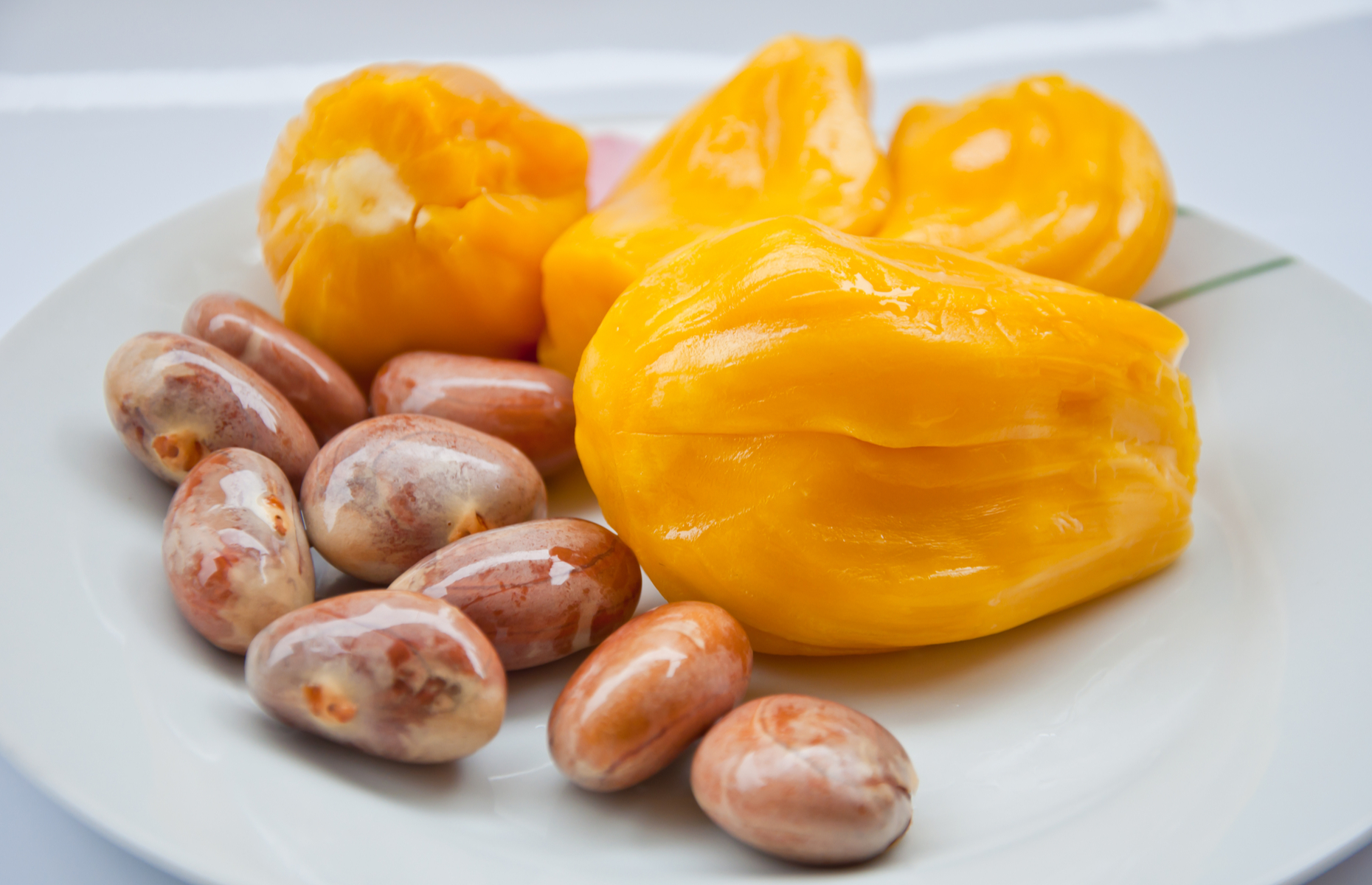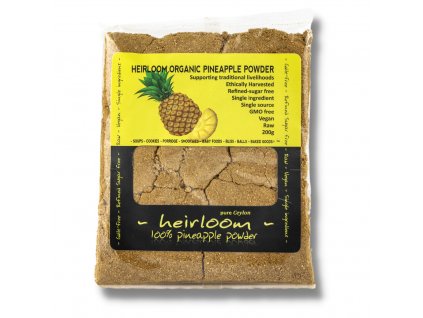Thickener from breadfruit - Jackfruit zdravější alternativa škrobových zahušťovadel - 100 g

Unikátní produkty
Dovážíme originální zahraniční výrobky, které lokální trh postrádá

Balíme rychle a ekologicky
Odesíláme do 24-48 hodin, vše v recyklovaných materiálech

Záruka kvality
Značky vybíráme srdcem a řídíme se heslem – raději méně, ale kvalitně

Doprava zdarma
Utraťte min. 4000 Kč a neplaťte poštovné do Balíkovny
Related products
Product detailed description
Why buy instead of starch?
Ceylon Kokonati 's heirloom jackfruit thickener is made from the seeds of a special variety of jackfruit, which are characterized by the fact that the powder can be mixed in virtually any liquid, where it largely dissolves and thickens it. DOES NOT FORM LUMPS.
- Breadfruit thickener is gluten-free, casein-free and non-inflammatory. You can use it as an alternative to conventional starch thickeners.
- It has a neutral, slightly cocoa flavour and is therefore suitable for both savoury and sweet dishes. You can use it to thicken curries, salad dressings, dips, soups and sauces.
- It is also suitable for baking, you can replace part of the flour (1 cup of flour 1/3 cup of powder) when baking cakes, muffins, bread, pancakes, etc.
- It can also be used in raw cuisine to create energy balls, bars or you can add a spoonful to a smoothie.
- It contains no sweeteners, preservatives, added sugar or other unnecessary fillers.
The huge nutritional potential of breadfruit seeds - a study
Although breadfruit seeds have been shown to contain a number of beneficial nutrients or bioactive compounds that add real value to food, they remain under-utilised due to the limited commercial production of breadfruit.
They contain a wide range of nutrient-rich ingredients such as starch, fibre, phytonutrients, protein, minerals, lectins and also beneficial ingredients such as phenols and flavonoids.
This review focuses on important findings regarding starch extraction techniques and various conventional and new modification techniques and their effect on the functional properties of breadfruit seeds.
Breadfruit seeds are mainly rich in starch (70-85 %), which is used in food and other areas as a thickener, stabiliser, microencapsulant, coagulant, bioplastic, etc. and provides significant health benefits.
The usefulness of starch from breadfruit seeds is also well known. The processing of breadfruit seeds using various techniques to achieve versatile nutritional and functional components has a significant impact.
The creation of composite films, starch, food products, bioethanol, pigments and medical applications are key areas of ongoing study.
This article is based on an analysis of more than 150 scientific publications, including recent studies by various researchers, with the main focus on the properties of breadfruit seeds.
Benefits of jackfruit as a thickener
- Rich in phytonutrients such as lignans and saponins.
- Rich in antioxidants and minerals such as calcium, magnesium, iron and copper.
- Rich in fibre, it supports normal digestive function.
- Supports normal insulin sensitivity
- Helps maintain a healthy electrolyte balance.
- It supports normal thyroid function and thus metabolism.
Read more on this topic
- Fruit flours I. - Breadfruit flour
- 9 Wonderful Benefits Of Jackfruit Seeds You Probably Didn't Know + A Killer Recipe
- Fruit flours II - Green banana flour
- Gluten-free diet not only for celiacs?
- Discover low carb or more energy, less sugar
- Vegetarian and vegan diet
- What to eat in winter to stay healthy?
- How to prevent Christmas overeating or mitigate its effects
- Enhance your workout with the right and effective supplements
What is a heirloom variety?
A so-called heirloom variety (whether of plants, seeds, fruits or vegetables) is an open-pollinated variety that was commonly cultivated in earlier times in human history, but is not used in modern large-scale agriculture because of the cartel-like behavior of a large corporation like Monsanto, which is behind the destruction of ancient seeds and the food chain in general across the planet.
See the document below. And here is a link to the website of a Canadian university, The University of British Columbia, which explains briefly what it is. If you do not speak English, use the online translator: deepl.com
We have translated this paragraph from the English Wikipedia:
Before the industrialisation of agriculture, a much wider variety of plant foods were grown for human consumption, mainly because farmers and gardeners saved seeds and cuttings for future planting. From the 16th century to the early 20th century, the diversity was enormous.
The old nursery catalogues were full of plums, peaches, pears and apples of many varieties and the seed catalogues offered legions of vegetable varieties. These catalogues were used to sell and trade valuable and carefully selected seeds along with useful advice on growing.
Since the Second World War, agriculture in the industrialised world has consisted mainly of food crops grown on large monoculture plots. Only a few varieties of each type of crop are grown to achieve the greatest consistency.
These varieties are often selected for their productivity and their ability to ripen at the same time and withstand mechanical harvesting and transport across borders, as well as their resistance to drought, frost or pesticides. This form of agriculture has led to a 75% decline in the genetic diversity of crops.
Although heirloom or heirloom cultivation has retained its place in local communities, it has seen a resurgence in recent years in response to the trend towards industrial agriculture. In the southern hemisphere, heirloom plants are still widely cultivated, for example in home gardens in South and Southeast Asia.
Before the Second World War, most of the products grown in the United States were heirloom varieties, but this was abandoned with the arrival of Monsanto.
Other sources of articles:
- The practice of Monsanto and BASF of Germany in pushing dicamba (a weed killer) on American farmers
- The Guardian:Revealed: Monsanto predicted cropping system will damage US farms
In the 21st century, many communities around the world are working to preserve historic varieties so that a wide range of fruits, vegetables, herbs and flowers are once again available to growers by restoring old orchards, sourcing historic fruit varieties, engaging in seed swaps and encouraging community participation.

Ceylon Kokonati uses only single origin, ethically harvested non GMO ingredients for their products. Their products are vegan, gluten-free, suitable for keto, paleo and raw diets. They do not contain any refined white sugar.
By buying them, you support traditional livelihoods and reduce your carbon footprint - because the products are produced and packaged right at the harvest site. Ceylon Kokonati strives for 100% zero waste production.
This product is internationally accredited by Control Union, certified organic (EU and USDA NOP), ISO and/or HACCP certified.
Ceylon Kokonati manufactures its products in a family-run sweatshop, pays fair prices to its suppliers and manufacturers, and incorporates generations of knowledge into its production processes. It uses only the highest quality ingredients.
So you can be sure that you are getting premium quality at a premium price. By purchasing products, you will be supporting the traditional livelihoods of villagers in the dry areas of Sri Lanka. This allows the villagers to benefit from their years of knowledge and expertise.
The sale of these products plays a vital role in employment and economic support for the village community. Ceylon Kokonati provides the children of its employees with school books and stationery for the entire school year.
What is single origin or "single origin"?
This claim means that the raw material comes from one geographical area(as opposed to raw materials taken from several countries around the world and then mixed together = a common practice for cheap products from so-called private labels).
None of Ceylon Kokonati's products is a so-called blend of several different ingredients from different parts of the world, bought at the cheapest prices. In English it is called'not blended'.
The fact that Ceylon Kokonati's ingredients/products are "single origin" from Sri Lanka only, means that the consumer's taste buds have a more consistent and higher quality experience, from batch to batch.
It is almost impossible to achieve an absolutely consistent taste without losing the natural flavour of the raw material. This is especially the case when the raw material for the production of a product is sourced from different places and of different quality.
In addition, you have no guarantee that it is really a pure and freshly produced product in organic quality.
Be the first who will post an article to this item!
Be the first who will post an article to this item!
Značka Ceilon Kokonati vznikla v roce 2013. V jejím sortimentu můžete najít řadu vysoce kvalitních a cenově dostupných produktů z kokosových ořechů, koření a tropického ovoce, vyráběných udržitelným způsobem.
Název značky odkazuje na zemi, kterou její zakladatelé považují za svůj domov Cejlon na Srí Lance, kde se také kokosy pro výrobu této kokosové řady produktů pěstují i zpracovávají. Cejlon, britská korunní kolonie v letech 1815-1948, je nyní známý jako Srí Lanka, ale zakladatelé značky mu raději říkají Cejlon, protože to rozhodně zní exotičtěji a "čistý Cejlon" je značka sama o sobě, připomínající svěží jedinečnou esenci čistého cejlonského čaje. “Kokonati” je zase maorský výraz pro kokos, takže naprosto nejvhodnější název značky těch nejkokosovatějších dobrot vůbec.
Značku Ceilon Kokonati vede manželský pár. Ženskou zakladatelskou polovičkou je paní Bûmika, což v sanskrtu znamená Paní Země. Její pradědeček byl jedním z průkopníků lisování kokosového oleje na Cejlonu, takže je již čtvrtou generací lisovače kokosového oleje. Mužská zakladatelská polovička, pan Mosqi, je zase původně pěstitelem čistého cejlonského čaje.
Ceilon Kokonati je stoprocentně vlastněna a provozována na Novém Zélandu. Sypké produkty od Kokonati používá několik etických značek, které vyrábějí čisté, ekologické potraviny a kosmetické výrobky. Prodejem výrobků Kokonati jsou podporovány venkovské komunity a tradiční způsoby obživy. Všechny jejich výrobky jsou eticky sklízeny a při jejich výrobě nevzniká téměř žádný odpad. Každá část kokosového ořechu je využita při výrobě jiného produktu. Výrobky Kokonati jsou jednosložkové, balené přímo u zdroje, nikdy nemíchané, jednodruhové, bez GMO a veganské.
Díky nadšení pro ekologické, regenerativní zemědělství, udržitelnost a kolektivní partnerství pocházejí výrobky Kokonati pouze z drobných farem a mlýnů ve venkovských vesnicích na Srí Lance. Každý výrobek Kokonati se vyrábí ve specializovaném mlýně, který produkuje pouze daný typ výrobku. Kvalita je tedy nejlepší, jaká může být, a každý krok výroby je podpořen zkušenostmi a znalostmi mnoha generací. Cejlon je požehnán množstvím zdravého, exotického ovoce, ořechů, bylin a koření.
Ceilon Kokonati se řídí zásadami vyváženého života - žij a nech žít.
Snaží se o to, aby vše zůstalo v ještě lepším stavu, než když to našli…

